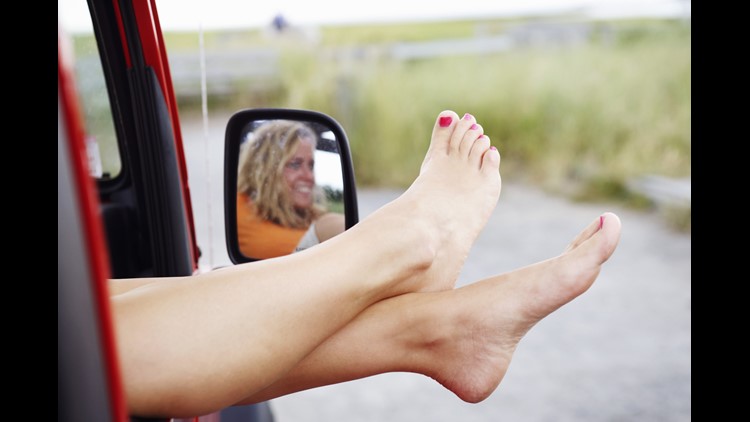April is Foot Health Month and Dr. Kurt Rode, from Saint Francis Hospital joined FOX 61 Good Day Connecticut to share some advice as we all head outside again to enjoy the warmer weather.
- Your feet have ¼ of all the bones in your body
- 75% of Americans will experience foot health problems at one time or another in their lives.
- When you’re running, pressure on your feet can be three or four times your body weight.
- Women have about four times as many foot problems as men
- An average, healthy person should aim to take 8,000 to 10,000 steps a day. That covers several miles and adds up to about 115,000 miles in a lifetime. By age 70, the average person will have walked the equivalent of 4 times around the globe.
- Walking is the best exercise for your feet. It also contributes to your general health by improving circulation, contributing to weight control and promoting all-around well being.
- Your feet mirror your general health. Such conditions as arthritis, diabetes, nerve and circulatory disorders can show their initial symptoms in the feet — so foot ailments can be your first sign of more serious medical problems.
Top 4 foot complaints:
- Metatarsalgia (Ball of foot pain) – There are a number of causes some including a neuroma, inflamed nerve: plantar plate tear, injury to soft tissue under the toe joint: capsulitis, inflammation of the joint capsule.
- Plantar Fasciitis – An inflammation of the band of fibrous connective tissue (fascia) running along the bottom (plantar surface) of the foot, from the heel to the ball of the foot. Plantar fasciitis occurs when the plantar fascia is strained over time beyond its normal extension, causing the soft tissue fibers of the fascia to tear or stretch at points along its length.
- Excessive Pronation – An abnormal amount of stretching and pulling on the ligaments and tendons attaching to the bottom back of the heel bone. Pronation is the normal flexible motion and flattening of the arch of the foot that allows it to adapt to ground surfaces and absorb shock in the normal walking pattern. Excessive pronation is the excessive inward motion.
- Achilles Tendinitis – Pain in the back of the heel. Achilles tendinitis happens when the Achilles tendon is inflamed.
What to look for in a shoe –
- Feet are generally categorized into three types: low/flat arch, normal arch, and high arch:
- Feet with low arches – Choose a supportive shoe that is designed for stability and motion control. These shoes help to correct for overpronation.
- Feet with normal arches -Choose a shoe with equal amounts of stability and cushioning to help absorb shock.
- Feet with high arches – Choose a cushioned shoe with a softer midsole and more flexibility. This will compensate for the poor shock absorption of a high-arched foot
Summer foot tips:
- Limit walking barefoot as it exposes feet to sunburn, as well as plantar warts, athlete’s foot, ringworm, and other infections and also increases risk of injury to your feet.
- Wear shoes or flip-flops around the pool, to the beach, in the locker room and even on the carpeting or in the bathroom of your hotel room to prevent injuries and limit the likelihood of contracting any bacterial infections.
- Remember to apply sunscreen all over your feet, especially the tops and fronts of ankles, and don’t forget to reapply after you’ve been in the water.
- Stay hydrated by drinking plenty of water throughout the day. Drinking water will not only help with overall health, but will also minimize any foot swelling caused by the heat.
- Keep blood flowing with periodic ankle flexes, toe wiggles, and calf stretches.
- Some activities at the beach, lake, or river may require different types of footwear to be worn. To be safe, always pack an extra pair of sneakers or protective water shoes. If your shoes will be getting wet, they should be dried out completely before your next wearing to prevent bacteria or fungus from growing.
- If you injure your foot or ankle while on vacation, seek professional medical attention from a podiatric physician.
- In case of minor foot problems, be prepared with the following on-the-go foot gear:



